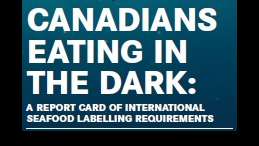SeaChoice calls for stronger seafood labelling regulations to prevent seafood fraud in Canada
Canada scores an F in regulatory report
HALIFAX AND VANCOUVER — Canada’s seafood labelling requirements fail consumers, particularly when compared to requirements governing two of our largest export partners, the European Union and the United States, according to a SeaChoice international seafood labelling report card released today.
“We found that Canada had the lowest standard of labelling among the three jurisdictions,” said Colleen Turlo, SeaChoice representative with the Ecology Action Centre. “Even the basics, such as the species’ scientific name and where and how it was caught, are not required on seafood labels in Canada, leaving consumers eating in the dark.”
Inadequate seafood labelling masks serious issues associated with health, environmental sustainability, quality assurances, human rights violations and illegal, unreported and unregulated fishing. It can be associated with seafood fraud, where seafood is advertised as something it is not.
Genetic testing conducted in Canada, the E.U. and the U.S. has exposed intentional and unintentional seafood fraud. While fraud has led other jurisdictions to implement stronger seafood labelling and/ortraceability requirements, Canada lags behind on both fronts. Canadians may be mistaking their seafood for something it’s not and unknowingly contributing to marine degradation or modern slavery.
“We know Canadians want better seafood labelling. It’s about the basic right to know what we are eating,” said Bill Wareham, SeaChoice representative with the David Suzuki Foundation. “More than 12,500 citizens signed a petition calling for the Canadian government to implement improved, mandatory seafood labelling requirements.”
While some seafood sellers and retailers are voluntarily labelling seafood more comprehensively, the lack of uniform regulatory requirements means that only some consumers have the information they need to make informed decisions. Standardized requirements would improve consumer confidence and hold businesses accountable.
“Given the importance of the seafood industry to Canada, and to coastal provinces in particular, we fail to understand why our country would not demand transparency in its seafood supply chain,” said Kelly Roebuck, SeaChoice representative with the Living Oceans Society. “With new regulations in the U.S. and changes coming through E.U. trade agreements, Canada would be wise to change its regulations now to avoid missing out on trade opportunities.”
In light of Canada’s failing grade, SeaChoice recommends two steps the federal government can take to create comprehensive seafood labelling regulations.
Step 1: Amend Canada’s food labelling policy to include the following information on seafood products:
• Species’ scientific name
• Production method (farmed or wild)
• Geographic origin (region of catch or area of production)
• Harvest method (gear type or farming method)
Step 2: Canadian food labelling policies should incorporate an onus on supply chain businesses to provide the necessary product information from source to customer to improve seafood traceability.
To further investigate seafood fraud, SeaChoice and the Canadian Centre for Biodiversity Genomics are recruiting citizen science volunteers to conduct seafood genetic testing across Canada to assess the level of seafood fraud and mislabelling in our markets. The full report can be downloaded at www.labelmyseafood.com.
-30-
Contact Information
Kelly Roebuck, Living Oceans Sustainable Seafood Campaigner
kroebuck [at] livingoceans.org
Background
SeaChoice is a collaboration between the Ecology Action Centre, David Suzuki Foundation and Living Oceans Society and has been working for over a decade to improve sustainable seafood purchasing policies among retailers across Canada, as well as to provide information to help consumers make sustainable seafood choices. SeaChoice is a member of the international Conservation Alliance for Seafood Solutions.
One Fish: Three Labels. An example of labels depicting mandatory requirements for Pacific Yellowtail rockfish sold in EU, US and Canadian stores.

